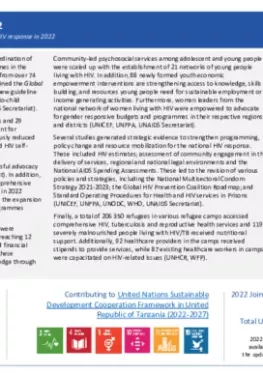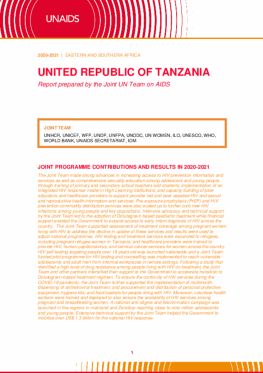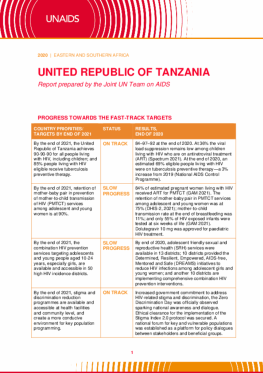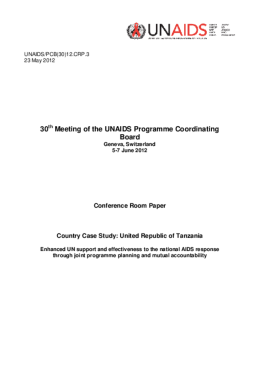|
United Republic of Tanzania
The United Republic of Tanzania continued to scale up HIV, SRH and gender-based violence education and services, with focus on adolescent and young people. Tanzania launched the Education Plus initiative and established a national committee to monitor implementation and progress of the national action (UNICEF, UNFPA, UN Women, WHO, UNAIDS Secretariat). Close to 60 000 students from 15 academic institutions received life skills-based CSE and an estimated 4700 students were tested for HIV (UNFPA, ILO, UNESCO). Over 23 400 students were also sensitized on HIV and gender-based violence, including sexual harassment; and 15 university campuses established a gender desk in collaboration with the Joint Programme (UNFPA, ILO, UNESCO). In addition, over 160 mentors of adolescents and young people and government officials had orientation on advocacy, human-centred programme design and meaningful engagement of young people (UNDP, UN Women, UNESCO).
HIV and SRHR messages were developed and disseminated through multiple media outlets reaching 50 000 young people in and out-of-college. In addition, 42 community-based radio professionals from 14 radio stations throughout the country were trained on producing and broadcasting radio shows covering HIV, SRH and gender-based violence (UNICEF, UNFPA, UNESCO).
The Network of Young People Living with HIV and AIDS in Tanzania (NYP+) scaled up community-led psychosocial services among adolescents and young people, which led to the establishment of 21 district-based networks of young people living with HIV. As part of the Cash Plus Ujana Salama programme, over 5800 adolescents improved their literacy on HIV, SRHR and sexual and gender-based violence and livelihood skills, of whom 3600 received grants to initiate income generating activities or pursue vocational training (UNICEF, UNFPA, UNESCO).
Elimination of vertical transmission monitoring and reporting tools and training packages were revised and 130 healthcare workers in antenatal care sites received training on the elimination of vertical transmission including triple testing of HIV, syphilis and hepatitis to support Tanzania’s progress to the triple elimination target. Dolutegravir-based paediatric treatment was introduced and a training package on management of dolutegravir-based paediatric treatment was developed with technical support from the Joint Programme. In addition, 58 000 women aged 30-60 years (71.4% of them living with HIV) accessed HIV testing and cervical cancer screening services through two councils in the Kagera Region (UNICEF, UN Women, WHO).
In humanitarian settings, 200 500 refugees in two camps received comprehensive HIV, tuberculosis and SRH services; 21 000 people, including pregnant women accessed HIV testing and those who tested positive were enrolled on treatment. Close to 250 healthcare providers and community health workers received stipends to maintain HIV, tuberculosis, ante- and post-natal care, elimination of vertical transmission, reproductive health and nutrition services in refugee camps. In addition, 264 000 refugees were sensitized on HIV and SRH and 453 000 male and female condoms were distributed in camps in collaboration with other partners (UNHCR, WFP).
Finally, successful coordination, advocacy and technical support led to the mobilization and evidence-informed prioritization of US$ 606.9 million for the national HIV, tuberculosis and malaria response and an additional US$ 10.8 million for Zanzibar through the Global Fund. In addition, US$ 380 million was mobilized from PEPFAR and prioritized for most impact for the national HIV response in 2023 in Mainland and Zanzibar (UNICEF, UNFPA, WHO, UNAIDS Secretariat).






